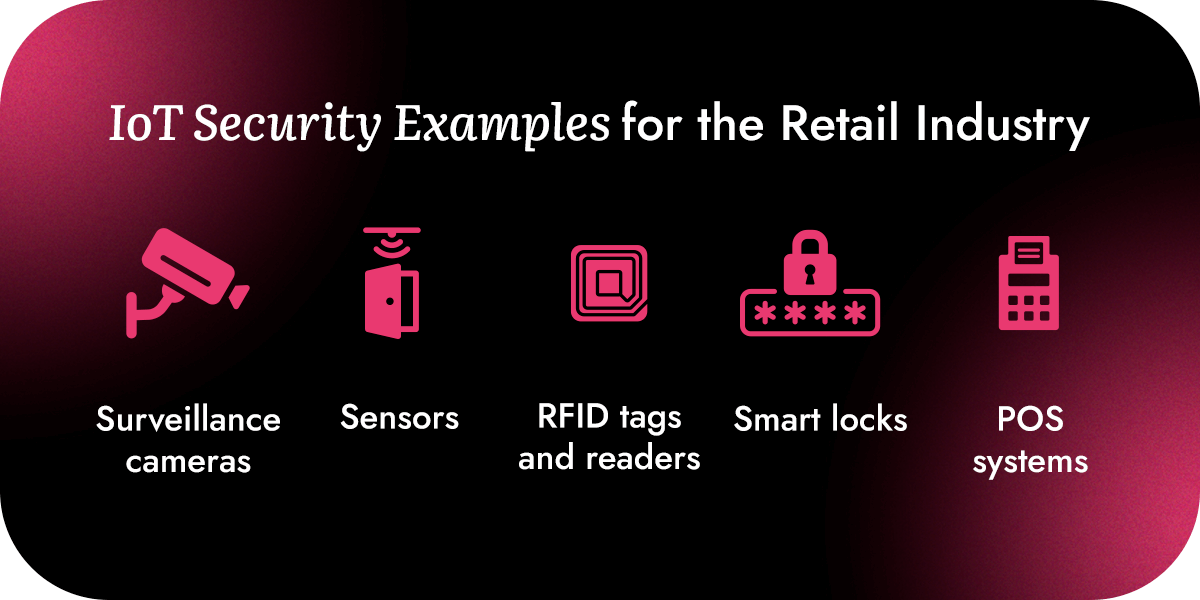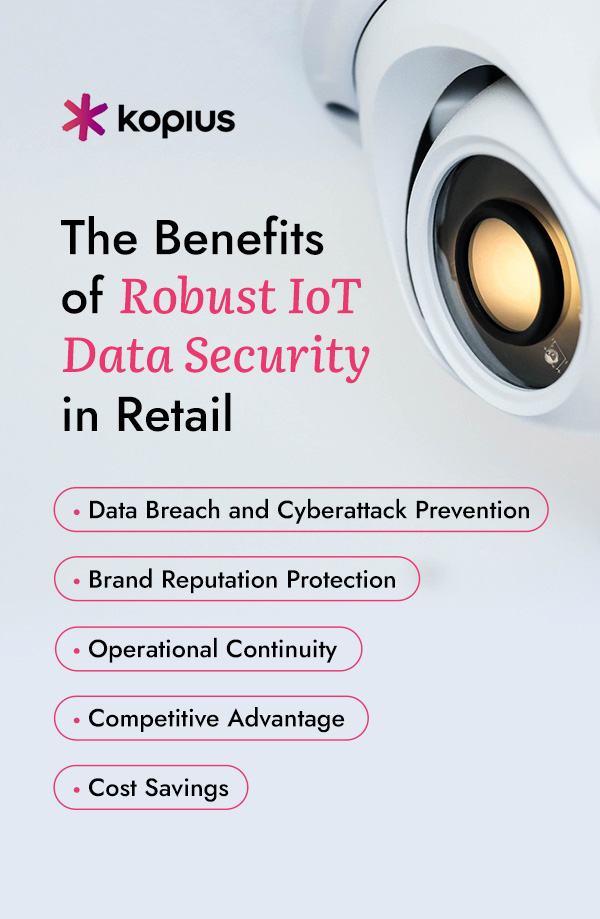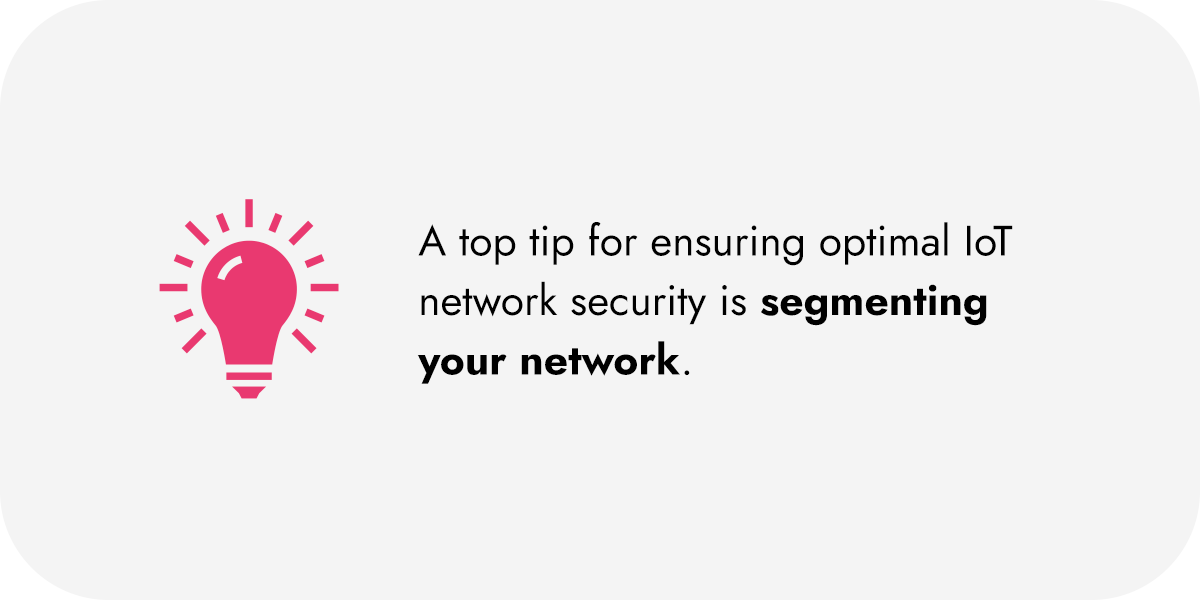
Digital technology is revolutionizing how retail businesses operate and interact with their customers. The Internet of Things (IoT) plays a key role in the industry’s evolution, helping stores gather valuable customer data to supercharge decision-making and deliver enhanced shopping experiences.
Internet of Things security is crucial to leveraging advanced digital technologies successfully. Understanding the importance of robust IoT security is key to ensuring your retail business is ready to innovate, adapt, and meet modern consumer demands without compromising confidential data.
Learn more about how IoT security works and why it’s so pivotal in the retail sector.
What Is IoT Security in Retail?
IoT security’s key elements in the retail industry include:
- Data protection: Customer and business data collected by IoT devices requires robust security solutions, like encryptions and advanced access controls to ensure compliance and privacy.
- Device security: An important element of IoT security is protecting individual IoT devices with routine software updates and authentication mechanisms. This helps prevent unauthorized access and safeguard data integrity.
- Network security: The network infrastructure used in connecting IoT devices requires firewalls, intrusion detection systems, and secure communication protocols to combat data breaches.
- Physical security: IoT security also employs physical protections, like surveillance cameras, access control systems, and tamper seals, to combat theft and tampering.
- Vendor management: Third-party vendors that retail businesses work with through IoT devices must meet strict security standards to mitigate potential risks.
- Team education and training: Cybersecurity and physical security awareness training ensures your team keeps devices secure and responds to incidents effectively. Human error is to blame for at least 88% of data breaches, so education on IoT cybersecurity best practices is essential.
Any organization that leverages interconnected technologies that collect, store, share, and manage personal or payment information — especially from customers — must prioritize robust security measures. IoT-enabled retail businesses need strong protections for their networks and physical devices to combat potential threats that can wreak havoc on their operations, reputation, and bottom line.
Robust cybersecurity in the retail industry is essential in today’s high-risk digital landscape, especially as cyber threats grow rapidly and more companies rely on IoT than ever before.
IoT Security Examples for the Retail Industry
Some common IoT devices used for retail security include:

- Surveillance cameras: IoT-enabled closed-circuit television security systems can enhance retail store security through round-the-clock surveillance.
- Sensors: Specialized IoT sensors can monitor environmental changes, detect issues, and share alerts about potential intruders in a retail or digital space.
- Radio-frequency identification (RFID) tags and readers: These digital technologies can enhance how retailers track and manage their inventory and assets. They can boost anti-theft measures through real-time location tracking and identification.
- Smart locks: Smart locks and IoT-enabled access control solutions allow retail businesses to oversee entry into different areas of their store, including restricted zones.
- Point-of-sale (POS) systems: Retailers also use IoT-enabled POS terminals to securely process customer transactions, track sales data, and improve accurate inventory management.
Why Is Retail IoT Security So Important?
Security in IoT is critical for keeping customer data protected and private. IoT systems in retail environments collect sensitive information about your shoppers, including personal insights, purchase histories, behavioral data, and payment details.
Without adequate security measures, the data from IoT devices, including surveillance cameras and sensors, may be vulnerable to cybercriminals looking to capitalize on system vulnerabilities.
Retailers need a deep understanding of their IoT and security issues. This ensures they take the necessary measures to combat unauthorized access and data breaches that can lead to theft, misuse, or fraud. Protecting customer privacy should always be a top priority.
In addition to safeguarding your customers’ information, IoT security is vital for supporting smooth business operations. Protecting your critical infrastructure against potential attacks helps prevent disruptions, financial losses, and reputational damage due to incidents.
Establishing strong security measures helps retail businesses safeguard their daily workflows and processes. They can also use IoT insights to drive efficiency, reduce downtime, and ultimately improve performance.
Retailers need a secure, agile, and scalable IoT ecosystem to adapt to the ever-changing market. That way, they can maintain operational efficiency and deliver the most intuitive and satisfying customer experiences.
The Benefits of Robust IoT Data Security in Retail
Retail businesses can reap many benefits from prioritizing a strong security posture to safeguard their data and private information. Keeping your IoT systems secure is essential to your company’s longevity and bottom line. Explore some of the key advantages below.

1. Data Breach and Cyberattack Prevention
IoT networks in the retail industry store sensitive data that cybercriminals want to access and exploit. Businesses need strong monitoring mechanisms, encryption protocols, and access controls to effectively combat data breaches, theft, and cyberattacks. These incidents can devastate retail operations, so a proactive approach to IoT security is essential for identifying and mitigating potential risks.
Rigorous data security measures are also key to protecting your retail business’s intellectual property. IoT systems often store confidential data relating to products, services, and company operations. Guarding these insights with proper cybersecurity measures is key to maintaining a competitive edge and capitalizing on proprietary processes or solutions.
2. Brand Reputation Protection
Demonstrating your retail business’s commitment to data protection is essential for fostering customer trust. Robust IoT security is key to portraying your brand’s reputation as reliable and safe. If consumers feel confident that your company will protect their payment details and personal information, they will be more likely to engage with your business and make purchases. Your level of security directly impacts customer loyalty and satisfaction, and a good reputation supports greater retention and growth.
If a data breach or cyberattack occurs, a powerful response plan effectively minimizes the impact on your customers and brand. Keeping your customers’ private data safe through robust security measures is integral to managing your brand’s trustworthiness.
3. Operational Continuity
Another benefit of robust IoT security is ensuring continued operations. Cyberattacks and data breaches can result in significant disruptions, leading to:
- Revenue loss.
- System failures.
- Downtime.
- Data loss.
- Reputational damage.
- Customer dissatisfaction.
Everything from inventory management to POS transactions can encounter disturbances from a security incident, leading to friction and negative experiences for your shoppers. Consumers demand uninterrupted service and reliable operations. Secure IoT networks and devices are necessary to avoid these issues, supporting productivity, efficiency, and continued operations.
4. Competitive Advantage
Retail businesses can also enjoy a competitive advantage by implementing strong IoT security measures. By establishing a reputation for prioritizing data security, companies can enhance their brand credibility and attract security-conscious consumers.
Today’s shoppers want to know they can trust the retailers they buy from, and maintaining a secure digital environment is key to demonstrating your commitment to protecting customer data. Investing in IoT security can give you an edge over the competition by delivering seamless customer experiences and benefiting your brand reputation.
Secure IoT systems also support enhanced data-backed decision-making to grow your business.
5. Cost Savings
The consequences of a data breach or cyberattack can be expensive. Regulatory fines, legal fees, theft, and data recovery can add up quickly. In 2023, the average cost of a data breach in the United States was a whopping $9.48 million, which can put a retailer out of business. Robust IoT data security measures can save costs and protect a company’s bottom line.
Retail businesses need strong protections to support long-term operational efficiency and business growth. Fostering a reputation for strong security and avoiding security incidents can also help companies protect their brand value and equity, reducing the costs of customer acquisition, retention, and even marketing.
Internet of Things Security Challenges for Retailers
Explore the key challenges of IoT security for retail businesses:
- Large attack surface: As companies introduce new digital technologies, Internet of Things device security is increasingly complicated by the growing attack surface. Cybercriminals have more entry points for potential attacks and data breaches, and retailers must implement greater defenses to combat the new vulnerabilities.
- Legacy systems: Another common security hurdle for retail businesses is integrating IoT devices with legacy systems. Compatibility issues can pose a serious threat, as many older solutions do not feature adequate protections in today’s digital landscape. Finding ways to protect older systems with the latest security standards can be complicated, expensive, and time-consuming.
- Supply chain risks: Third-party suppliers, partners, and vendors can introduce security risks throughout a retail business’s supply chain. Companies must find ways to secure their entire digital ecosystem and combat vulnerabilities, including devices, software, and services from outside organizations. Limited transparency and supply chain complexity can make tracking every component’s security posture difficult. Working with partners that prioritize robust IoT security is essential.
- Standardization: There are no universal IoT security criteria for retailers to follow, making uniformity and standardization difficult. Ensuring consistent security practices across diverse IoT devices and networks can be challenging and lead to potential vulnerabilities.
- Insider threats: Employee negligence or misconduct can be a huge IoT security challenge for retail businesses. Comprehensive training, education, and monitoring can help companies manage insider threats and ensure their team members do not intentionally or accidentally compromise IoT data.
- Physical security: Safeguarding physical IoT devices and infrastructure from unauthorized access, theft, and vandalism can be another major challenge for retailers. Proper surveillance and access control systems are necessary for ensuring physical security.
Compliance Standards for IoT Security in Retail
These IoT and security compliance requirements help ensure ethical data handling practices:
- Payment Card Industry Data Security Standard (PCI DSS): The PCI DSS outlines requirements for how cardholder data is collected, stored, and transmitted by a company’s IoT devices, such as POS terminals.
- National Institute of Standards and Technology (NIST) cybersecurity framework: Retailers must secure IoT devices and networks according to NIST guidelines to ensure the strongest cybersecurity posture.
- Federal Trade Commission (FTC) guidelines: The FTC outlines guidance for securing a business’s IoT system.
Retailers must also follow industry- and state-specific regulations, such as the California Consumer Privacy Act (CCPA). Compliance is necessary to avoid fines and reputational damage while demonstrating a company’s commitment to security to potential customers and partners. Meeting these standards helps retailers ensure they maintain a secure IoT environment.
Best Practices for Securing Retail IoT Devices
A few key strategies and best practices can help retail businesses maintain ongoing IoT security and protect their data:
1. Carry Out Regular Testing
Retailers should regularly test their IoT systems to identify possible vulnerabilities. Taking a proactive risk mitigation approach is key to maintaining the most secure network, and testing is an essential part of tackling potential dangers before they become larger and more serious threats.
2. Segment Your IoT Network

A top tip for ensuring optimal IoT network security is segmenting your network. By splitting up the system into smaller networks, you can gain greater insight into each segment, allowing your team to pinpoint security threats more efficiently than looking at the network as a whole.
3. Update Systems Often
Regularly patching and updating your network is essential for ongoing IoT device security. Cybercriminals and hackers are continuously searching for new vulnerabilities on your attack surface. Routine updates will help your systems remain protected against threats and ensure you have the latest security measures in place.
4. Implement Advanced Access Management
Retailers should prioritize unauthorized access prevention measures to ensure IoT data is safe from cybercriminals and hackers. Advanced controls and multifactor authentication can help businesses protect their systems, safeguarding confidential business insights and sensitive customer information.
5. Maintain Ongoing Monitoring
Monitoring every facet of your IoT network will help your business manage and mitigate security risks. Retailers need greater insight and visibility of their attack surface to ensure secure devices and uncompromised data.
6. Prioritize Comprehensive Team Training
Retail businesses can maximize IoT security by informing employees of potential threats and training them on the best practices. Continuous education and training update team members on securely using IoT devices, ensuring ongoing data protection.
Starting Your IoT Security Journey
The best way to ensure IoT security is to partner with an experienced provider who understands the best practices for protecting your environment against threats and vulnerabilities. With the JumpStart Retail partnership program from Kopius, your business can leverage IoT to foster tech-enabled innovation, elevate customer engagement, and create more satisfying digital and in-store experiences.
We designed our solution with robust IoT security to protect your business’s sensitive information and combat data breaches. Our experts will work with your team to determine the best measures for safeguarding your digital and physical environment from unauthorized access.
We make securing your data simple. Browse some of our case studies to see how we’ve empowered businesses to take a more innovative approach to data security.
JumpStart Your Retail IoT Security Strategy With Kopius
Innovating your retail business to keep up with the competition and ensuring a robust cybersecurity posture is essential. Kopius makes it easy to JumpStart digital technology and data success. Our data and AI ideation and prioritization program fast-tracks and enhances your company’s results.
We’ll help you boost customer satisfaction through an informed, data-driven approach. Our tech team’s extensive expertise allows us to supercharge IoT security solutions for retailers worldwide. We’ll tailor your program to your business’s unique needs and industry requirements, helping you improve customer experiences and benefiting your bottom line.
Contact our experts to partner with Kopius and JumpStart your business today.
Related Services:
- IoT Development Services
- Security & Compliance Solutions
- Retail Technology Solutions
- Data & Analytics Solutions
Additional Resources:
- How IoT is Leveraged in Retail Automation
- How Retail Analytics Transforms In-Store Operations
- Experiential Retail and Immersive Shopping
- AI in Retail
